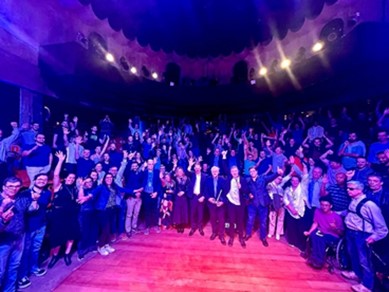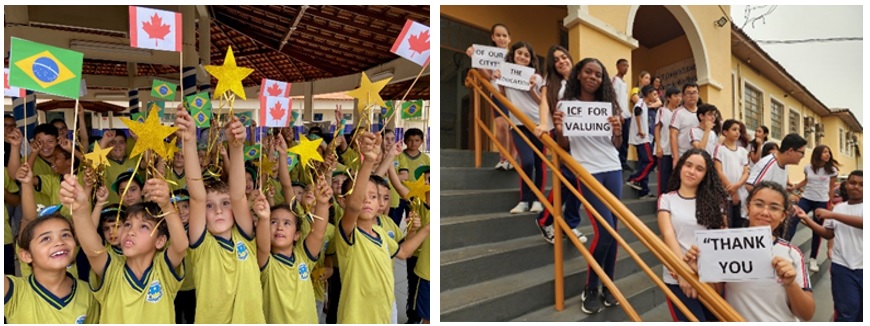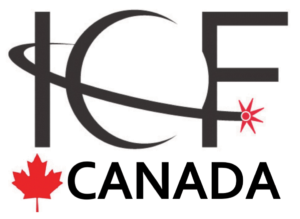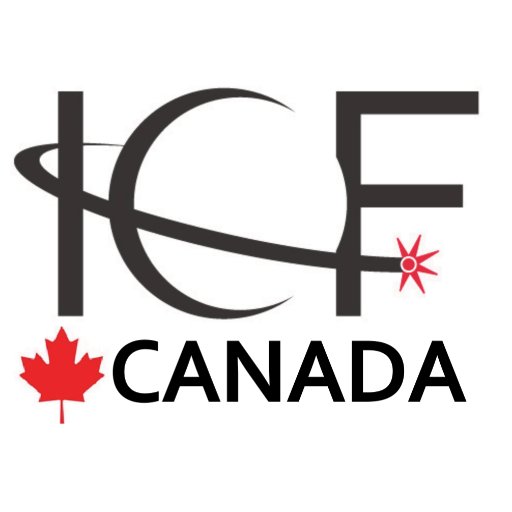
ICF Canada’s John G. Jung visited two of the 2024 Top7 Cities in Brazil
Here are images and media from his visit:

In Curitiba, Parana, Brazil, monthly gatherings called Paiol Digital are similar to TED Talks. ICF and its TOP7 site visit evaluation process was the focus of this gathering at a local heritage facility resembling a castle.

The immersive media facilities at the Pontifical Catholic University’s science and tech park in Curitiba are exceptionally impressive. Several rooms project images surrounding the entire room. Others provide media labs and access to equipment that professional media companies can only wish for.

Visiting the massive 8600 panel solar installation located on top of the closed Caximbra landfill site, generating 3500 megawatts supporting over a third of all of Curitiba’s municipal facilities. Nearby is an exceptional community relocation project, where the city and community members are moving their entire community 700 metres away from flood-prone lands next to a river. Worth learning more about! Read the translated versions of this report by author Fernando Henrique de Oliveira. To read the translated version see: https://www.intelligentcommunity.org/criador_do_conceito_de_smart_city_john_jung_elogia_curitiba_em_visita_t_cnica_para_a_escolha_da_comunidade_mais_inteligente_do_mundo_em_2024

The schools in Assai, Parana, Brazil were extremely welcoming and appreciative of our visit. We learned a great deal about this small hillside town’s journey to become in only two years among one of the most award winning communities in the world. We visited to learn their secret. In a word – education. And the political and community-wide will to make it happen. Limited resources plague small town, but there is much that they have done with so little. And they aspire to do more. Learn more from this article: https://gazzconecta.com.br/gazz-conecta/john-jung-deixa-recado-para-alunos-de-assai-sejam-inteligentes/ (Translation available).


Third article by Fernando Henrique de Oliveira:
TRANSLATION:
Top Seven in the ICF Ranking
In early November, the Intelligent Community Forum (ICF) will reveal the smartest world’s most intelligent community for 2024, an organization that has established the concept of smart cities nearly 30 years ago. This year, two cities from Paraná are competing for the title: Curitiba, which has been among the seven finalists for four consecutive years, and Assaí, a city in the Northern Pioneer region that has gained recognition from ICF, a leading authority on smart cities and intelligent communities.
John G. Jung is the co-founder of the ICF, which began its initiatives in 1995 at a conference called Smart’95, leading to its establishment in 1999 as one of the most prestigious global institutions promoting the concept of smart communities.
The award emerged in the same year, initially focusing only on the election of the world’s smartest community. Shortly after, it expanded, and since 2002, the ICF has released two unique annual rankings of the smartest communities before announcing the winner as most intelligent in the world: the first includes 21 cities, and the second has seven finalists for the ultimate annual award.
For the first time, Assaí entered the elite ranking of 21 communities, while Curitiba has been listed for six years. When the city, with just over 15,000 inhabitants, was announced, many wondered why it became one of the smartest communities in the world. Ultimately, there were several reasons that propelled it to the Top 7 finalists for this 2024 award.
Curitiba already held another recent title of the smartest city in the world for 2023, awarded by the World Smart City Awards at the Smart City Expo World Congress held in Barcelona last November. On Thursday, the city also received a silver medal at the Seoul Smart City Prize, another prestigious global award for smart cities. Now, it aims for the ICF trophy.
However, more than competitors, Curitiba and Assaí are going to Barcelona together, hoping to bring the title not just to Paraná but also to Latin America, which has yet to have any community named the smartest the most intelligent in the world by the ICF. Both cities carry compliments from the organization’s founder, who visited Paraná in early September for technical visits to both cities as part of the final evaluation process for the winning community.
In Curitiba, among the projects presented, the Novo Caximba Neighborhood caught Jung’s attention the most. This total revitalization of an invasion zone began in 2010 and has now resulted in what is considered the largest socio-environmental project in the city’s recent history, including the delivery of more than 1,100 new homes to local residents and the regularization of another 546, benefiting 1,673 families, as well as the spatial reorganization of the area. “This is planning with heart,” Jung said at the time.
Speaking of heart, John’s heart was full during his two days in Assaí. The city, which prioritizes education as its main asset for innovation and sustainable development, welcomed him with open arms. At every visit to the municipal schools, he was greeted with applause.
While this impressed him, the city’s focus on education and talent development excited him even more. “Building diverse and prosperous communities involves engaging people for sustainable development. And it starts with education. Assaí is heading in the right direction. Certainly, being in the Top 7, it is showcasing its example to the world,” he remarked.
Assaí and Curitiba are finalists alongside five other communities: Coral Gables and Hilliard in Florida and Ohio, respectively, in the United States; Durham Region in Ontario, Canada; Fredericton and New Brunswick, also in Canada; and Yunlin County in Taiwan.
Last year, Binh Duong in Vietnam was named the world’s most intelligent community of 2023. In Assaí, Jung had the chance to deliver a brief speech about the ICF and its annual award, providing examples of how smart communities can evolve into intelligent communities with the concrete intention of benefiting the local population by implementing technologies and innovations that enhance the quality of life.
The previous year’s champion was one of the examples he cited, as Binh Duong, like Assaí, was also primarily a rural community but recently sought to advance technologically and socially. For that, they looked for other smart and intelligent communities to model themselves after. The ICF helped in this regard, and advancements came—recognition from the institution is part of an important step in their history.
Why Is It Important to Discuss Intelligent Communities?
Curitiba is a smart city. This means it invests in the implementation of digital technologies and connectivity to improve citizens’ quality of life, enhancing public services and promoting sustainability.
However, according to Jung, while the concept of “smart city” also considers technology and connectivity as ways to improve life in a city, there is something that differentiates it from the concept of smart city. “The priorities are reversed,” he says.
For the ICF, which initiated the concept of “intelligent Communities”, citizens come first—and technology should contribute to the economic and social development of society, focusing primarily on people.
“It’s all about people,” emphasizes Jung. For the ICF, the concept of smart community goes beyond merely adopting digital technologies or having large tech companies in a city. What truly defines a smart community is the strategic use of digital connectivity and technology to promote economic, social, and cultural development inclusively, focusing on citizens’ well-being, hence ICF refers this difference as being an “intelligent Community”.
Jung lists the six factors defined by the ICF to designate a community as smart and intelligent: infrastructure and connectivity, skilled workforce, innovation, engagement, digital inclusion, sustainability, and, of course, education, which he believes is the foundation for all others.
These factors help cities and regions thrive in a rapidly evolving digital economy. The main differentiator for these communities is that they not only prioritize citizens but also create social connections, integrate the population into employment and income opportunities, foster partnerships to boost local development, and invest in innovation to accelerate economic growth—transforming it into something genuinely sustainable.
“When we talk about smart communities, we are talking about creating a better quality of life for people using digital technologies for economic, social, and cultural gains, all while aiming for a sustainable future,” Jung states.
The Role of the ICF
ICF seeks to mobilize a global network of communities and partners, encouraging the exchange of experiences and successful solutions among different cities, thus creating a virtuous cycle of innovation and progress.
In this way, ICF helps communities learn from one another by sharing practices that contribute to creating more favorable environments for business and societal development as a whole.
Additionally, the organization provides robust data on the communities it evaluates for its rankings, often surpassing analyses from specialized firms hired by large corporations, which can lead to savings for communities and better outcomes for administrative best practices.
Strengthening a network of smart communities that stand out not only for their technological achievements but also for the quality of life they offer to their citizens and their potential to attract new businesses is an example of this.
“The ICF is a networking organization. We promote the exchange of experiences between global communities, creating a virtuous cycle of innovation. Throughout these years, we have developed close relationships with various cities, facilitating a continuous process of learning and growth. Even when governments change or contact diminishes, the organization maintains its lists of smart communities, which serve as a reference source for other communities or businesses wanting to establish themselves in innovative locations committed to a sustainable future,” Jung explains.
For him, this connection with communities contributes to their continued recognition and promotion globally, enabling the sharing of innovations that can benefit businesses and the quality of life of citizens.
Thus, the ICF promotes the use of digital technology as a tool to create opportunities, develop dynamic and inclusive economies, and pass on this legacy of innovation and progress to future generations.
After getting to know Assaí, Jung noted that this year, the ICF has an “excellent small community Top 7.” Both Assaí and Curitiba can benefit from the experiences of other communities. However, he emphasizes that “what matters most is that their example is already being seen by the world.”


Want to have a voice in iCommunity.ca, the official newsletter of ICF Canada? Please send your blogs, announcements and other interesting content to John G. Jung at [email protected]

ICF Canada 1310-20 Bay Street Toronto, Ontario M5J 2N8 www.icf-canada.com
Contact: John G. Jung at [email protected] 1-647-801-4238 cell
Want to change how you receive these emails?
You can update your preferences or unsubscribe from this list
